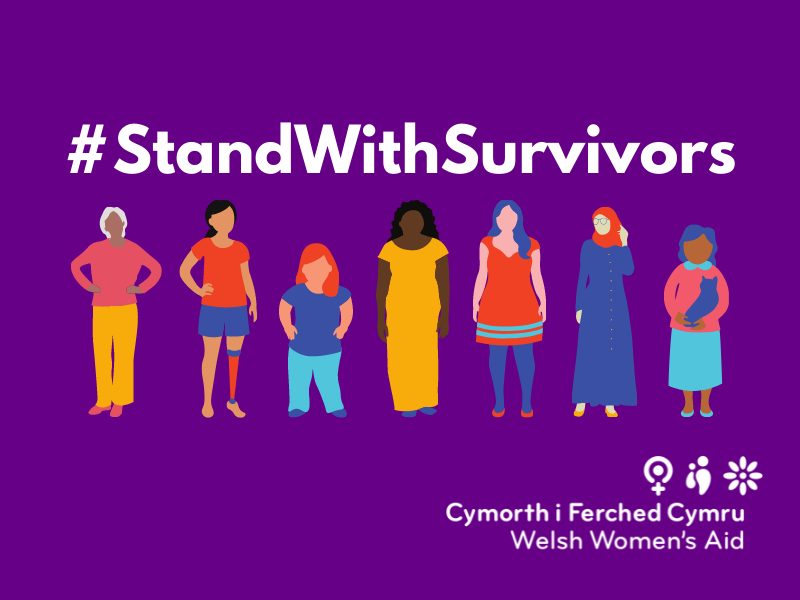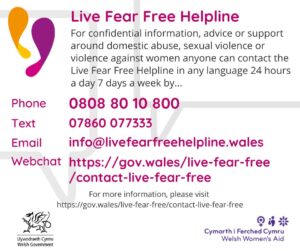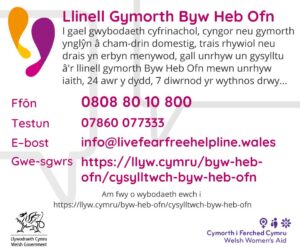
Self-isolation and social distancing may increase violence against women, domestic abuse and sexual violence and have an impact on survivors’ safety and support networks. Now more than ever, it is vital that we understand violence and abuse and support the needs of survivors.
Community response and social solidarity is even more vital in tackling violence against women, domestic abuse, sexual violence but we need to ensure this is done safely and effectively to best meet the needs of survivors across Wales.
We have developed this Bystander toolkit, consisting of specific advice and information for concerned neighbours, engaged volunteers and employers, journalists and others to ensure they can safely raise awareness and signpost to support.
Do’s and Don’ts – how to act safely and how to support
Safely Signposting to Support: Guidance on signposting and use of code-words during COVID 19
Safety and Self-Care information for Survivors
Information for Friends and Family
Information for Friends and Family (Polish)
Information for Friends and Family Easy Read (English)
Information for Friends and Family Easy Read (Welsh)
Leaflets available in Hindi, Portuguese, Polish and Somali here.
In an emergency: If the perpetrator is threatening, attacking or pursuing them, ring 999 as soon as possible.
Remember the Silent Solution system – if you cannot speak when the operator answers press 55 to make the call handler aware you are in danger and can’t speak. Here are posters for you to share to ensure more people know about this:
Infographics to share on social media
Promoting the Live Fear Free helpline widely on social media will help increase awareness of where a survivor or anyone concerned about someone else can get support of advice. We have created some graphics that you can download and share on social media or in group chats.


Employers
Many people have switched to working from home in response to social distancing and self-isolation guidance. This means the opportunity for a place of work to be a supportive space has changed for many survivors however managers are still in contact with staff regularly and there are actions you can take to remain supportive.
Supporting staff experiencing Domestic Abuse during COVID 19 pandemic: Briefing for Managers
Volunteering
Community volunteers and voluntary organisations are providing vital links for people to the services and support they need during social distancing and self-isolation. They may be coming in to contact with survivors of abuse and it is important that they know how to safely and supportively signpost to the Live Fear Free helpline and local specialist services.
Guidance for volunteering on domestic abuse and sexual violence during COVID 19
Children and Young People
The links below provide information and advice for young people on healthy relationships and support during COVID 19 based on our Safety, Trust and Respect Suite of Services:
- Healthy Relationships
- Online Relationships
- Relationships that hurt
- Coping with past abuse
- Checking up and Checking in – perpetrating abuse
- FGM – Your body belongs to YOU
- Forced Marriage
- FGM and Forced Marriage (Ahmaric)
- FGM and Forced Marriage (Arabic)
- Forced Marriage (Bengali)
- FGM and Forced Marriage (Farsi)
- FGM and Forced Marriage (French)
- FGM and Forced Marriage (Somali)
- FGM and Forced Marriage (Swahili)
- Forced Marriage (Urdu)
Journalists
The media have a unique and powerful opportunity to impact the way that society- including perpetrators, survivors and their families, friends and communities- receives messages about abuse and violence during the COVID 19.
Please find our guidance for journalists reporting on violence against women here:
Guidance for journalists reporting on VAWG during COVID 19
Looking for other ways to stand with survivors and support Welsh Women’s Aid? Read our tips for fundraising during lock-down here:
Why not check out our Bystander Intervention training too.

